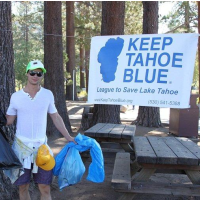Environmentalists Say California “Got Rolled” in Landmark Lake Tahoe Deal

Nevada and California capped decades of contentious debate over their shared interest in Lake Tahoe by recasting the compact that guides development around the storied resort area.
Political forces in Nevada, developers, business people and those who favor less government regulation and “smart” growth in a modern world won the battle. Environmentalists, for the most part, agreed in spirit with Trent W. Orr, an attorney at Earthjustice, who told the Los Angeles Times, “We got rolled.”
California lawmakers sealed the deal last week when they approved Senate Bill 630, legislation that ratified the revised “Tahoe Regional Planning Compact.” Changes to the 44-year-old bilateral agreement will encourage denser development, allow more input from localities on land-use issues and give special recognition to economic factors in weighing the worthiness of new projects.
The League to Save Lake Tahoe, one of the few environmental groups not deeply dismayed by the outcome, took solace in the fact the pact wasn’t totally eviscerated, which would have turned loose various localities and the state of Nevada to wreak havoc throughout the basin. “The league’s biggest position is uniform regulation is what’s best for the lake,” League Executive Director Darcie Collins told the Nevada Appeal.
Her fear was not unjustified. Nevada had tried to abrogate the compact on at least half a dozen occasions since 1975, but failed each time. However, in June 2011, Nevada Governor Brian Sandoval signed legislation calling for secession from the agency that oversees the pact unless it was amended to the state’s liking. Nevada also demanded that the compact incorporate those changes into a new regional plan by October 2013 and that Congress and California approve the compact changes by 2015.
Last December, the joint Tahoe Regional Planning Agency (TRPA) voted 12-1 to issue a new plan to local governments that allows for increased development in the area, weakens protection for the lake and the basin, and gives localities more say in land-use issues. The only “no” vote came from the California Assembly Speaker's representative, Mara Bresnick.
Laurel Ames of the Tahoe Area Sierra Club called the Nevada threat to withdraw a “sledgehammer,” and in a joint statement said the resulting changes “mangled current planning protections . . . and abandoned the lake.” The Sierra Club’s website asks, “Where will you go when the shores are crowded with buildings and choked with algae, traffic is horrific, special interests rule, and, sadly, Lake Tahoe is just another average lake?”
In February, Sierra Club and Friends of the West sued in U.S. District Court (pdf) to throw out the deal because “the Plan Update improperly delegates project review and approval to local governments, fails to require minimum regional standards, and is not supported by an adequate environmental analysis and proper threshold findings.”
The Tahoe conflict is one imbroglio that heavyweight politicians at the national level wished would go away. At the annual Lake Tahoe Summit, the California and Nevada governors were joined by California Senator Diane Feinstein, Senate Majority Leader Harry Reid of Nevada and former Vice President Al Gore in singing the compact’s praises and trashing the lawsuit.
“I tried to prevail upon them, and they didn’t listen to me,” Reid said of the Sierra Club lawsuit. “I’m right, they’re wrong.” Feinstein told the Sacramento Bee it was a “regrettable obstacle to progress in the region.”
Lake Tahoe is one of the largest and deepest lakes in the country. It also used to be one of the world's clearest. TRPA was created in 1969 to protect the lake area from local governments and developers gone wild, but by the time the two states could enact meaningful controls in the mid-1980s, the lake was losing clarity at one foot per year. That finally stabilized, but the clarity depth of 97 feet in 1967 has been reduced to 69 feet today.
In the end, the lake will be the final arbiter of whether the new compact is an improvement over the original.
–Ken Broder
To Learn More:
In Lake Tahoe Development Struggle, California Blinks, Nevada Wins (by Julie Cart, Los Angeles Times)
Letter: TRPA Members Don’t Speak the Truth (by David McClure, Roger Patching and Ann Nichols)
Environmental Groups Weigh in on California Bill (by Eric Heinz, Nevada Appeal)
Harry Reid, Jerry Brown, Feinstein Bash Environmentalists at Lake Tahoe Summit (by Michael Bastasch, The Daily Caller)
Nevada Pressure Leads to Developer Tilt at Lake Tahoe (by Ken Broder, AllGov California)
Sierra Club and Friends of the West v. Tahoe Regional Planning Agency (U.S. District Court for the Eastern District of California) (pdf)
- Top Stories
- Controversies
- Where is the Money Going?
- California and the Nation
- Appointments and Resignations
- Unusual News
- Latest News
- California Forbids U.S. Immigration Agents from Pretending to be Police
- California Lawmakers Urged to Strip “Self-Dealing” Tax Board of Its Duties
- Big Oil’s Grip on California
- Santa Cruz Police See Homeland Security Betrayal in Use of Gang Roundup as Cover for Immigration Raid
- Oil Companies Face Deadline to Stop Polluting California Groundwater





